Our Story
It's a simple story.
We all like to travel. We all love the outdoors. And we all love to spend quality time with good friends, debating the issues of the day, pondering the meaning of life and telling terrible stories and bad jokes. We have a passion for trekking, and a few times each year a small group of friends gathers in some remote place upon the globe for another trek.
We plan our own trips and like to go to spots that tourists do not frequent. In the past few years some of the places we've trekked include the Kingdom of Mustang in Nepal, the Simien Mountains of Ethiopia, Mt Fansipan in northern Vietnam, the Tien Shan Mountains of Kyrgyzstan and the High Atlas Mountains of central Morocco.
When you're off the beaten path and sleeping in a tent, you see things most tourists never see. You meet the "locals" and soon realize that life as we know it is not life as they know it. We've visited a number of schools and seen conditions which would be unthinkable in our countries. And we've met a number of wonderful kids who had no chance to go to school at all.
We talked about what we could do about the problems we saw. But not much came of those early discussions, as the demands of daily life soon took precedence once we returned home. But the stage was set.
In early 2009, Al read "Leaving Microsoft to Change the World", a wonderful book by John Wood that tells the story of how his life changed after a trek in Nepal. John left a senior executive position at Microsoft to start Room to Read. The book is a true inspiration and a great read. Al was able to arrange to have John speak to his peer-to-peer learning group in San Francisco. John's an amazing guy and an engaging speaker. When you hear him, you believe. He's taken the lessons he learned at Microsoft (think big!) and applied them to Room to Read. In a few short years he and his team have built an organization that has gone from nothing to one that has built over 1,400 schools, 11,200 libraries and distributed more than 9 million local language books.
After hearing John speak, we arranged to have dinner with him in a smaller setting with our spouses and significant others. To be frank, we didn't know how it would go. Our significant others are a big part of our lives and their opinions count. Fortunately, they were impressed as well. But for different reasons. While we might have been impressed by John's business acumen and success to date, they were impressed by John's passion, his ability to emphasize with those in need and how much he cared.
All six of us met to see what was next. We're lucky enough to have the resources to do some projects on our own. Al suggested we might build a few schools. Kjell and Liselott thought perhaps a few more. Leo sensed the need more than the rest of us due to his childhood experiences growing up in the third world. He threw down the gauntlet and said he was thinking about building 100 schools over the next decade.
It is really hard to disagree with Leo.
Opportunity for All was born.
We don't know where this will take us. We think it will be an exciting journey, but it has just begun. Now we're hoping to build 1,000 schools. We're looking forward to the ride and hope that the opportunities we are able to provide might significantly impact the opportunities in life for a number of children around the world.
We all like to travel. We all love the outdoors. And we all love to spend quality time with good friends, debating the issues of the day, pondering the meaning of life and telling terrible stories and bad jokes. We have a passion for trekking, and a few times each year a small group of friends gathers in some remote place upon the globe for another trek.
We plan our own trips and like to go to spots that tourists do not frequent. In the past few years some of the places we've trekked include the Kingdom of Mustang in Nepal, the Simien Mountains of Ethiopia, Mt Fansipan in northern Vietnam, the Tien Shan Mountains of Kyrgyzstan and the High Atlas Mountains of central Morocco.
When you're off the beaten path and sleeping in a tent, you see things most tourists never see. You meet the "locals" and soon realize that life as we know it is not life as they know it. We've visited a number of schools and seen conditions which would be unthinkable in our countries. And we've met a number of wonderful kids who had no chance to go to school at all.
We talked about what we could do about the problems we saw. But not much came of those early discussions, as the demands of daily life soon took precedence once we returned home. But the stage was set.
In early 2009, Al read "Leaving Microsoft to Change the World", a wonderful book by John Wood that tells the story of how his life changed after a trek in Nepal. John left a senior executive position at Microsoft to start Room to Read. The book is a true inspiration and a great read. Al was able to arrange to have John speak to his peer-to-peer learning group in San Francisco. John's an amazing guy and an engaging speaker. When you hear him, you believe. He's taken the lessons he learned at Microsoft (think big!) and applied them to Room to Read. In a few short years he and his team have built an organization that has gone from nothing to one that has built over 1,400 schools, 11,200 libraries and distributed more than 9 million local language books.
After hearing John speak, we arranged to have dinner with him in a smaller setting with our spouses and significant others. To be frank, we didn't know how it would go. Our significant others are a big part of our lives and their opinions count. Fortunately, they were impressed as well. But for different reasons. While we might have been impressed by John's business acumen and success to date, they were impressed by John's passion, his ability to emphasize with those in need and how much he cared.
All six of us met to see what was next. We're lucky enough to have the resources to do some projects on our own. Al suggested we might build a few schools. Kjell and Liselott thought perhaps a few more. Leo sensed the need more than the rest of us due to his childhood experiences growing up in the third world. He threw down the gauntlet and said he was thinking about building 100 schools over the next decade.
It is really hard to disagree with Leo.
Opportunity for All was born.
We don't know where this will take us. We think it will be an exciting journey, but it has just begun. Now we're hoping to build 1,000 schools. We're looking forward to the ride and hope that the opportunities we are able to provide might significantly impact the opportunities in life for a number of children around the world.
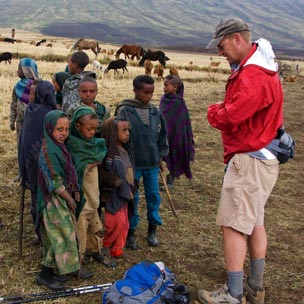
Kjell talking to a group of children in Ethiopia. They should be in school. Instead, they are watching the family goats and cows.
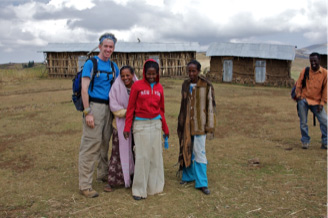
Al visiting a rural school in the Simien Mountains in Ethiopia. The three women in the picture are the school's teachers.
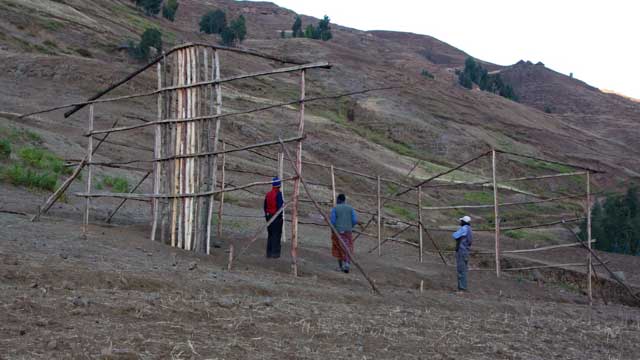
This may look like a school under construction. It's not. The project has been stalled for over a year due to the lack of funds, supplies and organizational know-how. Meanwhile, the local kids sit outside when they go to school. Not many of them do.
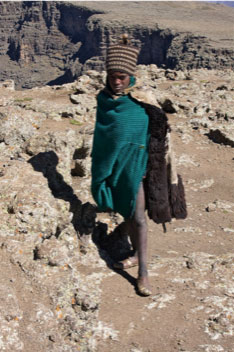
This young lad lives in a cave on the top of Ras Dashen, one of the highest Mountains in Western Africa watching a small herd of family goats. What type of opportunity will he have in later life?
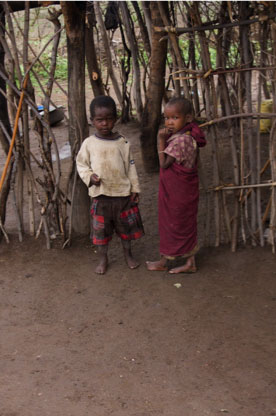
A local home in Tanzania. When there has been no resources in a community for hundreds of years, outside help might be needed to provide a catalyst for change.
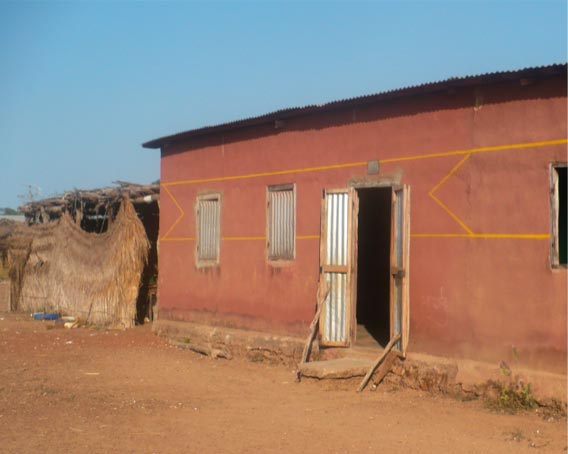
A "school" in western Africa.